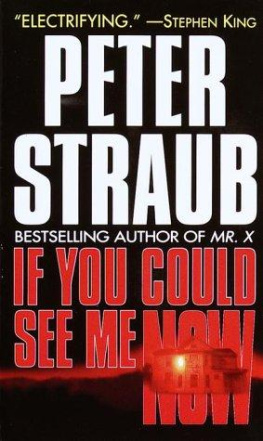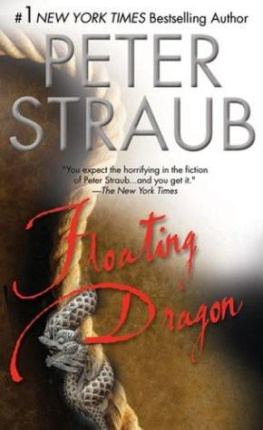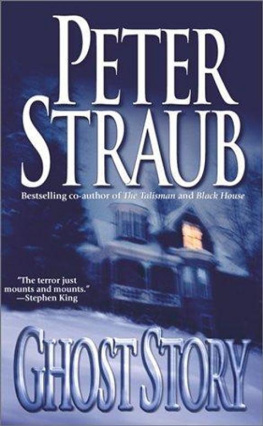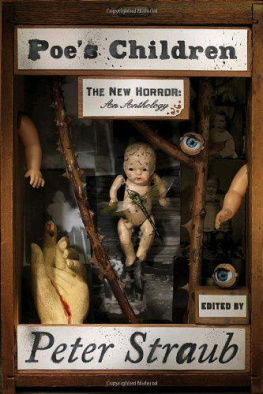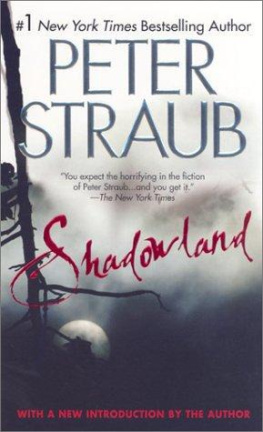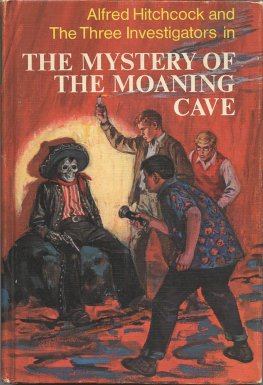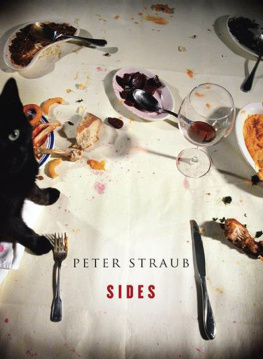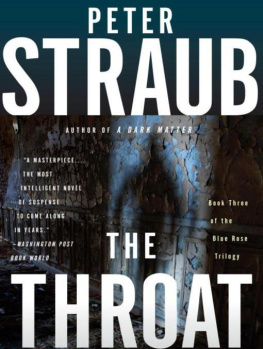"Some of the best
suspense writing in years"
Bari Wood, co-author of Twins
The erupting nightmare of murder after murder cannot stop him. The crazed townspeople cannot stop him. Miles has returned for a reason.
Now he holds the photograph. He and Alison, hand in hand. As they must have been seen by all, their spirits flowing toward each other, more one than two drops of blood in one bloodstream. This is not what he expected. It is what must be.
And now he knows what has drawn him into the horror which surrounds him horror at the hands both of the living and the dead!
"A snapping story of the occult, suspenseful to the last"
New Haven Register
"Compulsive reading. It has marvelous atmosphere, suspense, and a truly grand Guignol ending."
Dorothy Eden
Books by Peter Straub
If You Could See Me Now
Julia
Marriages
Published by POCKET BOOKS
PETER STRAUB
IF YOU
COULD SEE
ME NOW
PULISHED BY POCKET BOOKS NEW YORK
POCKET BOOKS, a Simon & Schuster division of
GULF & WESTERN CORPORATION
1230 Avenue of the Americas, New York, N.Y.
Copyright 1977 by Peter Straub
Published by arrangement with Coward, McCann & Geoghegan, Inc.
Library of Congress Catalog Card Number: 76-57730
All rights reserved, including the right to reproduce
this book or portions thereof in any form whatsoever.
For information address Coward, McCann & Geoghegan, Inc.,
200 Madison Avenue, New York, N.Y. 10016
ISBN: 0-671-81844-9
First Pocket Books printing February, 1979
10 9 8 7 6 5 4 3 2 1
Trademarks registered in the United States and other countries.
Printed in the U.S.A.
for Carol Smith
and for Robin and Justin
in memory of
a hundred long-distance calls
'There's a long statement in the papers, sir, about a murder... But someone is always being murdered, and I didn't read it.'
David Copperfield
You can walk away from anything but a strong smell: it haunts
you, calls you back.
Book of the Cranberry Islands,
Richard Grossinger
July 21, 1955
__________
"Winter has already started," said Alison.
"Huh?"
"Winter started a month ago."
"I don't get you."
"What day is it?"
"The twenty-first of July. Thursday."
"God, look at those stars," she said. "I'd like to take a big step off the planet and just go sailing through them." He and Alison, cousins from opposite ends of the continent, lay side by side on their grandmother's lawn in that part of rural Wisconsin nearest the Mississippi River, and looked up past the dark massive heads of the walnut trees to the sky. Oral Roberts' country voice came drifting to them from the porch of their grandmother's house. "My spirit is passing into you," Oral Roberts was shouting, and Alison's mother, Loretta Greening, softly laughed. The boy turned his head sideways on the coarse, springy grass and looked at his cousin's profile. It was fox-sharp, ardent, and if will could lift her off the earth she would already be sailing away from him. He caught her smell of cold, bracing water. "God," she repeated, "I'd just buzz around up there, wouldn't I? I feel that way sometimes when I listen to Gerry Mulligan. Do you know about him?"
He did not.
"Boy, you should really live in California. In San Francisco. Not just because we could see each other more, but Florida is so damn far away from everything. Gerry Mulligan would just slay you. He's really cool. Progressive jazz."
"I do wish we lived near you. That would be neat."
"I hate all my relatives except for you and my father." She turned her head toward his face and gave him a smile of brilliant, heart-stopping whiteness. "And I suppose I see him even less than I see you."
"Lucky me."
"You could look at it that way." She turned away from him again. They could hear their mothers' voices mingling with the noise from the radio. Their grandmother, Jessie, the shrewd center of the family, was doing something in the kitchen, and from time to time through the crossweave of the sisters' conversation on the porch slid her softer voice. She had been closeted all day with cousin Duane (pronounced Dew-ane), who was about to be married. Their grandmother opposed the marriage, the children knew, for reasons tenuous but forceful.
"You got into trouble again last year," Alison said.
He grunted assent, embarrassed, not wanting to talk about it. She was not supposed to know about the side of him that got into trouble. Last time it had very nearly been serious, and the entire messy context of the trouble raged in his dreams several nights a week.
"You get into a lot of trouble, don't you?"
"I guess so."
"I get into a little trouble, too. Not like you, but enough to make them notice me. I had to change schools. How many times have you changed schools?"
"Four times. But the second time was the second time was just because one of the teachers hated me."
"I had an affair with my art teacher."
He looked at her sharply, but could not tell if she were lying. He thought that she probably was not.
"Is that why they made you leave?"
"No. They kicked me out because they caught me smoking."
Now he knew that it was true lies were never as anticlimactic as that. He felt intensely jealous and intensely interested. Both of these feelings were mixed with a large measure of admiration. At fourteen, a year older than he, Alison was part of the passionate adult world of affairs and cigarettes and cocktails. She had previously revealed to him her enthusiasm for martinis "with a twist" whatever a twist was.
"Old Duane would like to have an affair with you," he said.
She snickered. "Well, I'm afraid old Duane doesn't have much of a chance." Then, rushing at him with all of her unexpected, ardent force, she rolled rapidly over onto her side and faced him. "Do you know what he did yesterday? He asked me if I wanted to go out for a ride in his pickup, this was while you and your mother were visiting Auntie Rinn, and I said sure, why not, and he took me for a drive and he put his hand on my knee as soon as we left the driveway He only took it off when we passed the church." She laughed again, as if this last detail were the conclusive proof of Duane's unsuitability as a lover.
"You let him?"
"His hand was sweating," Alison said through her laughter indeed said it so loudly that the boy wondered if Duane could hear it "and it felt like he was rubbing tractor grease or something all over my knee. I said, 'I bet you don't have much luck with girls, do you, Duane?' and he pulled over and made me get out."
"Are there any boys you like up here?" He wanted her to give a flat negative, and her reply at first made him flush with satisfaction.
"Here? Are you kidding? First of all, I don't like the boys very much, they're so inexperienced, and I don't like the aroma of the barnyard that surrounds most farmboys. But I think Polar Bears Hovre is sort of goodlooking."
Polar Bears, so called because of the whiteness of his hair, was the son of the Arden Township policeman, and he was a tall, rather chunky boy of nearly Duane's age who had several times driven over to the Updahl farm to ogle Alison. He was a famous tearaway, though as far as the boy knew, he had not yet been made to leave any schools.
"He thinks you're goodlooking too, but I suppose even a lout like Polar Bears would notice that."
"Well, you know that I only love you." But she said it so lightly that the phrase seemed smooth with overuse.
"I'll accept that," he said, thinking it sounded sophisticated the kind of thing her art teacher might say.
Duane had begun to shout in the kitchen, but they, like their mothers on the porch, ignored it.
Next page
